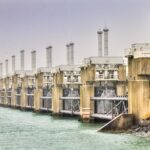Na Richard Tol, Roger Pielke jr en Hans von Storch in Der Spiegel (en NRC), en diverse onderzoekers op Revkins DotEarth vindt opnieuw een prominent IPCC-auteur het tijd voor fundamentele veranderingen bij het IPCC. Andrew Weaver, van de University of Victoria, geeft in een Canadese krant toe dat het IPCC zich niet heeft gehouden aan haar taak:
Andrew Weaver, a climatologist at the University of Victoria, says the leadership of the Intergovernmental Panel on Climate Change (IPCC) has allowed it to advocate for action on global warming, rather than serve simply as a neutral science advisory body.
“There’s been some dangerous crossing of that line,” said Weaver on Tuesday, echoing the published sentiments of other top climate scientists in the U.S. and Europe this week.
Pleitbezorging
Er valt volgens Weaver veel voor te zeggen dat sommige topfiguren binnen het IPCC, die zich aan pleitbezorging schuldig hebben gemaakt, het veld moeten ruimen. Ook vindt hij dat het IPCC te groot is geworden:
“Some might argue we need a change in some of the upper leadership of the IPCC, who are perceived as becoming advocates,” he told Canwest News Service. “I think that is a very legitimate question.”
Weaver also says the IPCC has become too large and unwieldy. He says its periodic reports, such as the 3,000 page, 2007 report that won the Nobel Prize, are eating up valuable academic resources and driving scientists to produce work on tight, artificial deadlines, at the expense of other, longer-term inquiries that are equally important to understanding climate change.
“The problem we have is that the IPCC process has taken on a life of its own,” says Weaver, a climate-modelling physicist who co-authored chapters in the past three IPCC reports.
“I think the IPCC needs a fundamental shift.”
De druk is enorm
Om een idee te geven wat voor vlees we met Weaver, die meewerkte aan drie van de vier IPCC-rapporten hier een fragment uit de National Post die de uitlatingen van Weaver in context plaatst:
So hot, apparently, that Andrew Weaver, probably Canada’s leading climate scientist, is calling for replacement of IPCC leadership and institutional reform.
If Andrew Weaver is heading for the exits, it’s a pretty sure sign that the United Nations agency is under monumental stress. Mr. Weaver, after all, has been a major IPCC science insider for years. He is Canada Research Chair in Climate Modelling and Analysis at the University of Victoria, mastermind of one of the most sophisticated climate modelling systems on the planet, and lead author on two recent landmark IPCC reports. For him to say, as he told Canwest News yesterday, that there has been some “dangereous crossing” of the line between climate advocacy and science at the IPCC is stunning in itself.
Not only is Mr. Weaver an IPCC insider. He has also, over the years, generated his own volume of climate advocacy that often seemed to have crossed that dangereous line between hype and science. It is Mr. Weaver, for example, who said the IPCC’s 2007 science report — the one now subject to some scrutiny —“isn’t a smoking gun; climate is a battalion of intergalactic smoking missiles.”
Weaver was zelf dus ook niet vies van enige overdrijving en pleitbezorging, maar zonder de hand direct in eigen boezem te steken ziet hij nu blijkbaar in dat genoeg genoeg is.
Weaver vindt ook – maar dat is al bijna geen nieuws meer – dat Pachauri moet aftreden. Jammer dat hij in het stuk niet uitlegt waarom Pachauri wat hem betreft überhaupt niet had moeten aantreden:
Weaver says Pachauri, the panel’s chairman, should resign, not only for his recent failings but because he was a poor choice to lead the IPCC to begin with.
Aureool
Ook criticus Ross McKitrick komt in het stuk aan het woord:
Ross McKitrick, an economist at the University of Guelph, Ont., and a well-known IPCC critic, says the panel’s scientific failings, and its willingness to cross the line into advocacy, will eventually percolate into the policy arena.
“The halo has come off the IPCC,” he says. “At the time of the 2007 report, there were very few politicians willing to question statements from the IPCC. Now, as this plays out, people will start to be embarrassed to cite the IPCC.”
Te groot
Weaver houdt een pleidooi voor werken in kleinere groepen op specifieke vraagstukken:
But Weaver admits the IPCC needs to change, for the sake of climate science, and for its own credibility. He also says the IPCC must stop producing huge, all-encompassing reports on every aspect of climate science and instead re-organize itself into a series of small, highly-focused groups, each tasked with examining a single specific scientific question and none required to publish their conclusions on quick deadlines.
And he says IPCC officials must cease being “over enthusiastic” in pushing for policy changes.
“Nobody should be using particular pieces of information to advance an agenda,” says Weaver. “The IPCC cannot be an advocate, because it’s not tasked to do that.”
Ik ga mee met Weavers voorstel om in kleinere groepjes rapporten te gaan schrijven over specifieke vraagstukken (climate sensitivity, zeespiegel, modellen, temperatuurmetingen etc.). Dit is ook de aanpak van het Amerikaanse CCSP-programma. Maar ervaringen daar van onder andere Roger Pielke sr, die zich terugtrok als auteur van een van de rapporten, laten zien dat ook daar eenzijdigheid en pleitbezorging op de loer liggen. Veel hangt af van welke groep onderzoekers je bij elkaar zet.
Voor een keer zijn Weaver en McKitrick het eens:
“The IPCC is not going to be able to recover from this unless there’s an honest attempt to reform their procedures,” says McKitrick. “They need to start doing what they’ve always claimed to do — to be balanced, and open, and scientifically rigorous.”






Uh huh,..
Morgen valt de blauwe envelop weer in mijn brievenbus, dan moet ik betalen voor de afkoeling.
Het hele IPCC en al haar leden dienen af te treden en nooit meer aan werk te komen. Eerst schreeuwen dat de wereld afkoelt, dan opwarmt en dan vervolgens weer schreeuwen dat hij afkoelt.
Ondertussen politiek advies uitbrengen dat we de burger maar steeds meer moeten uitmelken. Ik ben dit soort gasten helemaal zat. 'Wetenschappers', laat me niet lachen.
Als je wist dat het IPCC geen wetenschap bedreef, als je wist dat het IPCC zich niet aan haar mandaat hield, dan stap je er toch uit? Dan ga je niet achteraf huilie huilie doen,..
Aanklagen die handel.
Oh, en gelijk ook even de Nobelprijs afschaffen. Die stelt ondertussen ook geen ruk meer voor.
Jaja, er is paniek in de tent. Nu moet er doorgepakt worden!
Hier een eindconclusie van Arthur Rörsch op DDS >.”Er zit niets anders op dan van meet af aan opnieuw een onderzoek in te stellen naar het wezen der dingen” (in ons geval de oorzaken van klimaatverandering)
Een niet mis te verstane conclusie waar ik me bij aansluit.
Leuk wat die Weaver vertelt, maar wat je zelf ook al constateert: hij deed er zelf ook aan mee.
Zo wordt het wel erg vrijblijvend: je biecht je zonde op, en "voortaan moet het beter georganiseerd worden".
Ondertussen zijn er wereldwijd voor meer dan € 100 miljard aan emissierechten uitgegeven, waar de gewone burger voor betaalt, zijn er hele belastingstelsels die op de schop zijn gegaan, en dan zo´n praatje.
Ik hoop en verwacht dat heel die klimaatfraude ook een justitieel vervolg krijgt.
Want dit is witte boordencriminaliteit pur sang, de uiterste vorm, erger dan de hele bankencrisis, want dit is absichtliche bedonderij !